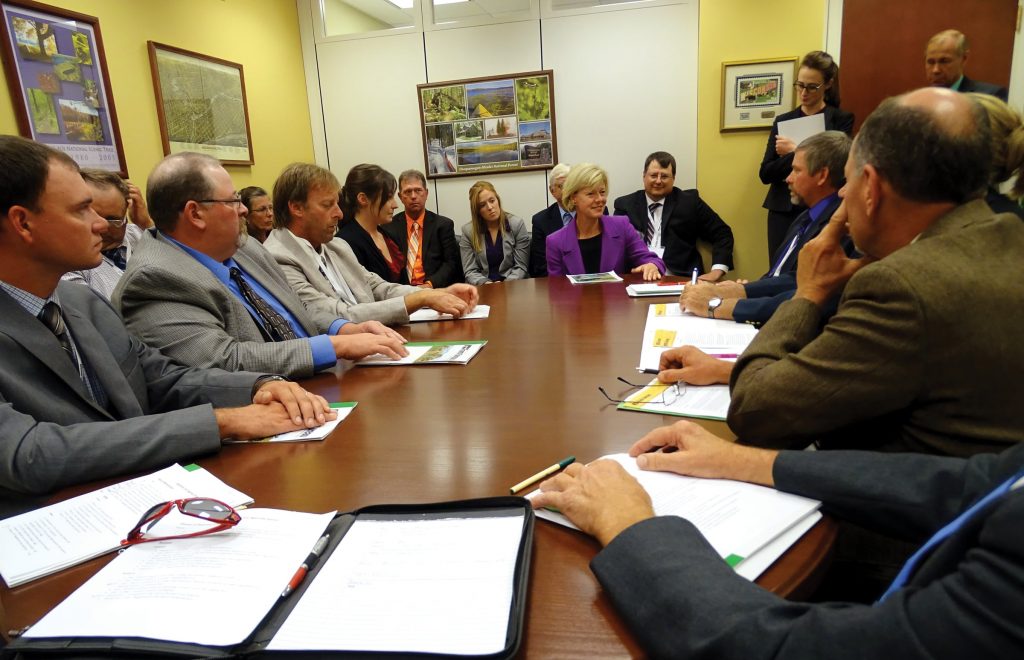While they may have wished to be farming back in Wisconsin, the three days in Washington, D.C., that I spent with a group of Farm Bureau members in September produced great yields. Every time I see our members working the halls of Congress I’m reminded that when they’re not growing crops and livestock, farmers make great lobbyists, too.
I don’t have to tell you the baggage that comes with the word lobbyist.
Don’t get me wrong, advocating on behalf of farmers is a dream job, but some of agriculture’s critics write me off as a mouthpiece for polluters, corporate and big money special interests. The reality is Farm Bureau’s lobbyists work to bring the farmer common sense of our members to Madison and Washington, D.C.
Yet we lobbyists cannot accomplish this alone. The Wisconsin Farm Bureau Federation is a well-respected organization among lawmakers because our members take the time to talk to advocate on their own behalf.
 Lawmakers know that farmers have their boots on the ground every day. Farmers have firsthand knowledge of the implications that governmental rules and regulations will have in the real world. Farmers bear the costs and burdens of additional training, licensure and inspection of the regulations they must follow. Who better to get feedback from?
Lawmakers know that farmers have their boots on the ground every day. Farmers have firsthand knowledge of the implications that governmental rules and regulations will have in the real world. Farmers bear the costs and burdens of additional training, licensure and inspection of the regulations they must follow. Who better to get feedback from?
During our time in D.C., it was clear that Wisconsin’s members of Congress wanted to hear how the Waters of the United States rule is going to negatively impact farming practices for generations to come. They wanted to hear how vital a strong dairy-focused agreement within the Trans-Pacific Partnership trade negotiations will impact our state’s signature industry from people who actually milk cows every day.
Nobody is better equipped to deliver these messages than the farmers and agriculturists whose livelihoods depend on them. Those real life stories from rural Wisconsin are what a lawmaker remembers as they cast their votes.
Farm Bureau members are busy people. Busy with their farms; busy serving on school, town and county boards; busy with civic, community and church groups, busy raising families, livestock and crops. While your own plate may seem overflowing at times, never for a second doubt the impact that you have with lawmakers and the public when advocating for agriculture.
Statistically speaking, farmers are among the most trusted demographics by the public, and yet they make up less than 2 percent of the population. That’s a lot of ground to cover with those farm boots. Whether it be at Ag Day at the Capitol, a breakfast on the farm, county fair or within the U.S. Capitol, your voice carries weight with elected officials. The bottom line is no one can advocate for farming better than a farmer.
Cultivating relationships with elected officials and advancing wise agricultural policy takes time, just like raising crops or livestock. Farm Bureau’s local policy development meetings, Ag Day at the Capitol, Institute leadership course and trips to D.C. all set the stage for farmers to shine.
On those days when you’re up to your ears in farming, trust that Farm Bureau’s governmental relations team is somewhere advocating on your behalf; however, never forget the impact you have when you take a turn doing our jobs.
Karen is the Director of Governmental Relations for the Wisconsin Farm Bureau Federation. Growing up in the country, Karen got her first taste of agriculture raising rabbits and poultry as 4-H projects. She joined the Farm Bureau in February, 2011. The Fort Atkinson area is where Karen and her husband, Brad, as well as their three young children call home.



Leave a Reply